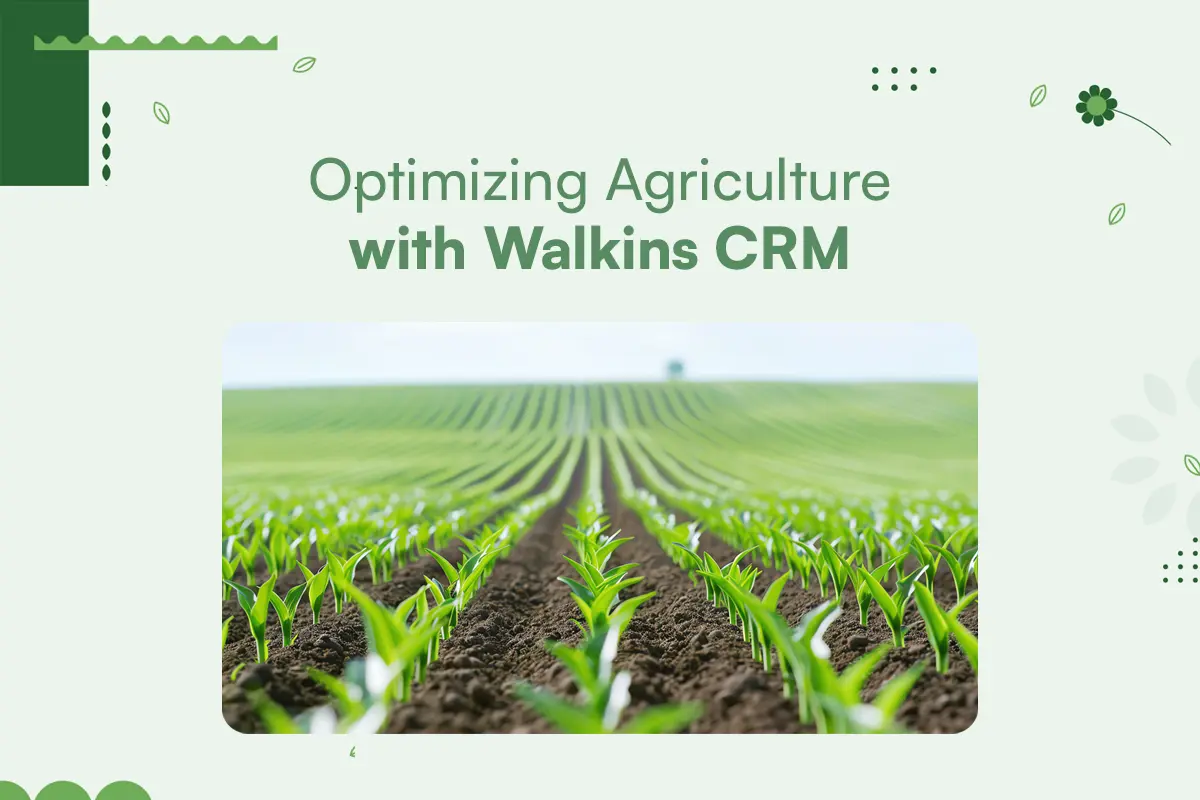Sustainability has become a critical focus across industries, particularly in agriculture, where the balance between resource use and long-term viability is essential. The agriculture industry, responsible for feeding the world, faces unique challenges in maintaining this balance—dealing with resource constraints, managing environmental impacts, and ensuring profitability. In this context, sustainable practices, supported by efficient technological solutions, play a pivotal role.
One such technological solution is Customer Relationship Management (CRM) systems. While CRM is traditionally associated with managing customer interactions and improving sales processes, it can also drive sustainability in industries like agriculture. Walkins CRM, known for its powerful analytics and resource management capabilities, can aid agriculture businesses in implementing sustainable practices by optimizing resource usage, improving decision-making, and enhancing operational efficiency.
In this blog, we’ll explore how Walkins CRM can promote sustainability in agriculture, diving into efficient resource management and the critical role of analytics in fostering long-term success.
1. The Intersection of Sustainability and Agriculture
Agriculture, as the foundation of food production, has a significant environmental footprint. This includes high water consumption, greenhouse gas emissions, soil degradation, and the overuse of pesticides and fertilizers. To mitigate these impacts and ensure the long-term viability of farming operations, sustainable practices are increasingly necessary. These include:
- Efficient Water Use: Reducing water consumption through precision irrigation and better water management.
- Soil Health: Maintaining soil fertility and structure by using organic fertilizers, crop rotation, and reduced tillage.
- Biodiversity: Encouraging the growth of diverse crops to maintain ecosystem health.
- Energy Efficiency: Utilizing renewable energy sources and reducing reliance on fossil fuels.
- Waste Reduction: Minimizing food waste and improving post-harvest management.
Achieving sustainability in agriculture is no longer just a noble goal but a business necessity. This is where technology, such as Walkins CRM, becomes an essential tool.
2. How Walkins CRM Supports Sustainable Agriculture
At its core, Walkins CRM is designed to streamline operations, enhance communication, and optimize processes. But beyond these traditional CRM functions, it offers tools that can help agricultural businesses achieve their sustainability goals.
a. Efficient Resource Management
One of the critical areas where Walkins CRM can aid agriculture businesses is in managing resources more effectively. Agriculture relies heavily on natural resources, and waste or overuse of these resources can lead to both environmental and financial losses.
With Walkins CRM, farmers can track the use of water, fertilizer, pesticides, and energy. By providing a consolidated view of resource allocation, the CRM enables businesses to make data-driven decisions on optimizing inputs. For example:
- Water Management: Through integration with IoT devices such as soil moisture sensors and weather data, Walkins CRM can help farmers decide when and how much to irrigate, reducing water waste and promoting efficient water use.
- Fertilizer and Pesticide Application: Walkins CRM allows for the monitoring of crop health and growth cycles, ensuring that fertilizers and pesticides are applied only when necessary. This not only reduces chemical runoff into nearby water sources but also cuts down on the cost of excessive input use.
b. Enhanced Analytics for Better Decision-Making
Analytics plays a critical role in sustainable agriculture, allowing farmers and agricultural businesses to predict outcomes, manage risks, and plan for future needs. Walkins CRM’s advanced analytics features empower agriculture businesses to:
- Predict Crop Yields: By analyzing historical data, soil conditions, weather patterns, and other critical factors, Walkins CRM can forecast crop yields, helping farmers plan better for harvesting and distribution while reducing waste.
- Monitor Environmental Impact: CRM’s reporting tools can be customized to track key environmental metrics, such as carbon emissions, soil quality, and water usage, giving farmers insights into their sustainability performance and areas where they can improve.
- Supply Chain Optimization: By tracking the entire supply chain from farm to table, Walkins CRM helps identify inefficiencies in transportation, storage, and distribution. Optimizing these areas can reduce energy consumption and minimize food spoilage, contributing to a more sustainable supply chain.
c. Supporting Sustainable Certifications
Many agricultural businesses aim to achieve sustainability certifications, such as Organic, Fair Trade, or Rainforest Alliance. These certifications require detailed tracking and reporting of farming practices, resource use, and environmental impact. Walkins CRM simplifies this process by:
- Documenting Practices: Farmers can record sustainable practices, such as organic fertilizer use, crop rotation schedules, and energy-efficient machinery usage, within the CRM. This documentation is crucial for audits and certification processes.
- Compliance Tracking: The CRM can be set to remind farmers of key compliance deadlines or regulatory changes, ensuring that they stay on track to meet certification requirements.
By centralizing and organizing this information, Walkins CRM makes it easier for agriculture businesses to achieve and maintain sustainability certifications, which can also open up new market opportunities.
3. Improving Operational Efficiency with Walkins CRM
Sustainability in agriculture is not just about resource management—it’s also about improving operational efficiency across the board. Walkins CRM can streamline various aspects of agricultural operations, reducing waste and improving productivity:
a. Automated Workflows
Automation is one of the key strengths of Walkins CRM. Agriculture businesses can create automated workflows for tasks such as:
- Field Operations: Scheduling planting, irrigation, and harvesting tasks based on real-time data, ensuring that resources are used optimally without human error.
- Supply Chain Management: Automating order fulfillment and delivery processes reduces delays and energy use, contributing to a more efficient and sustainable supply chain.
- Customer Communication: Walkins CRM allows for automated communication with distributors, retailers, and even customers, ensuring that the right information is shared at the right time. This reduces the risk of overproduction, which can lead to waste.
b. Inventory and Stock Management
Inventory management is crucial in agriculture, where products have limited shelf lives. Walkins CRM offers robust inventory tracking features that allow farmers to:
- Reduce Overstocking: By accurately forecasting demand, the CRM can help avoid overproduction or over-ordering of supplies, reducing waste.
- Minimize Spoilage: By managing storage conditions and expiration dates, the CRM helps reduce spoilage and waste in both food and materials.
c. Collaboration and Communication
Collaboration across different departments, from farming operations to sales and marketing, is essential for an efficient agricultural business. Walkins CRM fosters better communication by providing a centralized platform where all stakeholders can access the same information.
- Unified Data Access: Everyone from field workers to sales managers can access real-time data on crop yields, inventory levels, and sales performance, ensuring that decisions are made based on the most up-to-date information.
- Task Coordination: The CRM allows for better coordination of tasks, reducing overlap or inefficiencies. For example, marketing teams can time promotions based on harvest schedules, avoiding last-minute rushes or shortages.
4. Aligning Business Growth with Sustainability
Sustainability doesn’t have to come at the cost of business growth. In fact, sustainable practices often lead to long-term profitability by reducing costs and improving resource efficiency. Walkins CRM can help agriculture businesses align their growth strategies with their sustainability goals by:
- Tracking Financial Performance: By monitoring the financial impact of sustainable practices, such as reduced water or fertilizer use, businesses can quantify the return on investment (ROI) of their sustainability initiatives.
- Customer Engagement: Consumers are increasingly looking for sustainably produced products. Walkins CRM can help agriculture businesses build stronger relationships with these consumers by promoting their sustainability efforts, leading to increased brand loyalty and sales.
Conclusion
Sustainability is no longer optional for agriculture businesses; it is essential for ensuring long-term viability and success. By leveraging the power of Walkins CRM, agricultural businesses can implement sustainable practices that improve resource management, optimize operations, and enhance decision-making through data-driven insights.
From efficient water use and energy-saving workflows to enhanced analytics and collaboration, Walkins CRM offers the tools necessary for agriculture businesses to thrive in an increasingly sustainability-focused world. By integrating technology with traditional agricultural practices, businesses can meet the demands of today while safeguarding the future.


